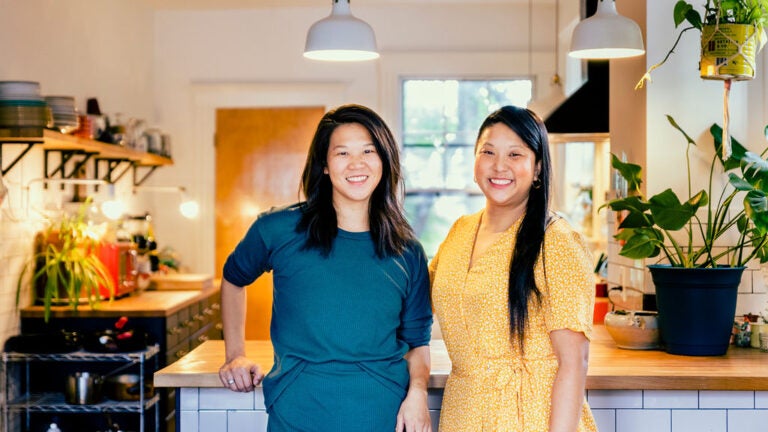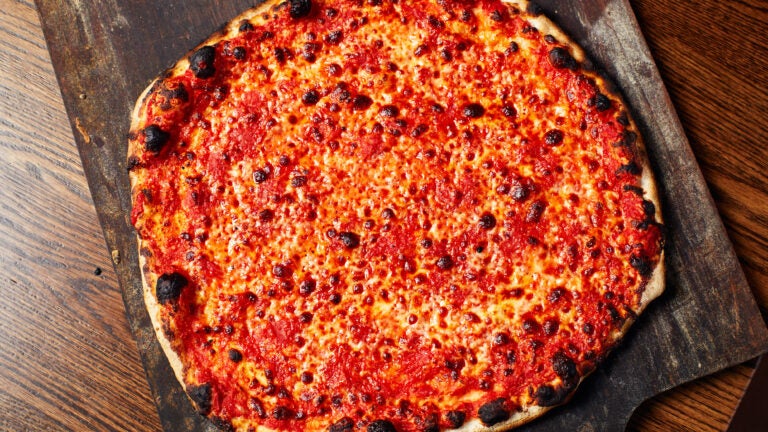📚 Stay up-to-date on the Book Club
Catch up on the latest Boston.com Book Club pick and join the virtual author discussions.

Zero-waste cooking doesn’t have to be limiting. That’s the message of Margaret and Irene Li, the sisters behind local favorite Mei Mei Dumplings and authors of the new cookbook, “Perfectly Good Food: A Totally Achievable Zero Waste Approach to Home Cooking.”
The duo joined Boston.com’s Book Club to share their tips and tricks for zero-waste cooking around the holidays and beyond and talked with readers about the importance of building sustainable practices around food.
The Li sisters started Mei Mei Dumplings with their brother, Andrew, as a food truck, that has since grown to a new factory and cafe in South Boston. Today, their dumplings can also be found at local farmer’s markets, specialty stores, and TD Garden. Although they’ve opened a restaurant and written multiple cookbooks, the sisters said they still consider themselves home cooks.
“Even though we are technically professional chefs, I think we’re still home cooks that heart and that’s where a lot of this ethos comes from…knowing that cooking at home has to be accessible, it has to be fun or you’re just not going to want to do it,” Irene shared.
Their new cookbook features easy-to-follow recipes and suggestions for zero-waste cooking that will make you want to make use of the food in your fridge right away.
When food goes uneaten, “many hundreds of billions of dollars worth of food” goes to waste, Irene told the audience during the author discussion.
“Not just the food itself that goes into a landfill and creates methane — which is a very potent greenhouse gas — but also all of the resources that it took to grow that food: The water, the labor, the soil, the fertilizer, all of the trucking of that food packaging, getting it to the grocery store, getting it home to your kitchen.”
Alarming statistics aside, Mei emphasized that zero-waste cooking is also a rewarding way to “make delicious things out of so many leftover items.”
Read on for takeaways from last night’s discussion or watch the video below and sign up for more Book Club updates.
The duo lead the discussion with some surprising statistics: More than a third of all food produced in the United States goes uneaten and almost half of wasted food in the country is generated at the household level. In fact, the average American household wastes $30 a week in groceries by letting food expire or tossing leftovers.
“When you think about throwing away something that’s in your fridge, there have already been so many resources poured into it and so that’s something that we do want to keep in mind when we talk about this problem,” Irene said.
As restaurateurs, it’s part of their training to get the most out of every ingredient they purchase, and the sisters said their new cookbook helps share that knowledge with home cooks.
“The job of saving food is something that a lot of us don’t know how to do,” Mei said. “So that is why we’re here. We want to share our tips and tricks with you and hopefully not only be able to have that satisfying feeling of keeping food out of the trash but also, ideally, cutting your grocery bill, and keeping food out of the landfill — all the good things that come with saving your food, including more delicious things to eat.”
Whether you’re cooking a feast for Thanksgiving or just a couple of dishes for you and some loved ones, there are some things you can do before the big meal to limit food waste. Before you create your menu, search your pantry for any ingredients that you can use up. Shelf-stable items in your cupboard may be forgotten throughout the year, but Thanksgiving is the perfect time to bring them out for a new dish.
“Could you make a salad with what you’ve got? Could you add a non-traditional dessert? Whatever it is, you could probably figure out something to make with what you’ve got,” Mei said. “And then you can save yourself some money on your Thanksgiving shopping and throw in a fun new dish and, who knows, maybe it’ll become your go-to for Thanksgivings to come.”
Between Thanksgiving prep and leftovers, you’ll likely be left with a fair share of extra food this week. Save all of it and freeze as much as you can, the sisters said. Food scraps like onion skins, celery ends, and garlic peels will keep well in the freezer for future stocks. Bread can also be frozen and used at a later date.
For leftovers you don’t want to freeze, repurpose them into another meal. Thanksgiving leftovers make great sandwiches, galettes, tarts, fritters, and more. Irene’s favorite way to use up leftovers is to turn them into dumplings. She fills them with potato, stuffing, and turkey and uses the gravy as a dipping sauce.
“I think I might love the leftovers of Thanksgiving more than the Thanksgiving meal itself,” Mei shared.
You can benefit from cutting down on food waste in your kitchen all year round, not just around the holidays. “Perfectly Good Food” is filled with tips and tricks to fill out your pantry and fridge with ingredients you can use again and again.
One of the tips shared by a reader during the author discussion and featured in the duo’s book is to create stock and smoothie bags in your freezer. Herbs also keep well in the freezer, especially when they’re frozen in water and thawed for later use. You can also stock up on cupboard items like whole grains that keep for a long time — regardless of the manufacturer-suggested ‘Best By’ date, which the sisters said are rarely accurate — and can be used in multiple recipes.
“It’s nice to be able to build recipes around whatever you have. And that kind of goes back to what we mentioned before, the various things that you stock up on, and have in your pantry so you always know you can make a meal based on whatever you’ve got,” Mei said.
One of the things that hold people back from zero-waste cooking is an aversion to trying new foods and dishes. If you can get past your initial reservations, you’ll get more out of nearly everything on your grocery list, the sisters said. For example, you may think of cucumbers as an ingredient for cold dishes, but the book includes a recipe for a stir-fried cucumber with pork.
“If you can be open-minded to eating things in new ways, that can help you use up a lot of food that maybe is not perfect for the way you typically like to eat it,” Mei said.
Flexibility is key in reducing food waste, Irene added. “There are a lot of foods that you can manipulate the texture, the flavor profile, the spices, or the herbs that you use. And if you’re willing to be flexible about how you eat it, you can still get a lot of value out of it,” she said.
During the discussion, a reader named Rachel shared that Boston-area residents should support Food Link, an Arlington-based charity that “rescues surplus fresh food” and delivers it to community organizations in Greater Boston.
Mei Mei Dumplings is committed to sourcing ingredients locally and sustainably, Irene said, and they share that mindset with several other restaurants in the Boston area. She recommended readers try Clover Food Lab and Brassica Kitchen + Cafe in Jamaica Plain for food that’s both sustainable and delicious.
Before the discussion, chef Irene was joined by Boston Globe Today at Mei Mei Dumplings to make fresh dumplings and talk about the restaurant’s commitment to sustainable cooking.
Catch up on the latest Boston.com Book Club pick and join the virtual author discussions.

Stay up to date with everything Boston. Receive the latest news and breaking updates, straight from our newsroom to your inbox.
Be civil. Be kind.
Read our full community guidelines.